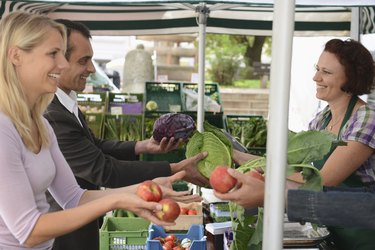
More and more organic foods are appearing, even on mainstream store shelves. Organics come with a higher price tag, and may have some other drawbacks as well. When choosing packaged foods or produce for your family, making decisions about how best to spend your food dollars can be confusing. With more information, you can decide which foods work for your family and how to best budget for the healthiest and most environmentally friendly foods.
Cost
Video of the Day
For the end consumer, cost is one of the biggest disadvantages of organic foods. Organic farming is more time and labor intensive, and the organic certification process can be costly and difficult. USDA organic certification and labeling have strict requirements. A smaller amount of organic food is grown per acre and there is less demand for organic foods on the market. Increased consumer and corporate demand may reduce the price of organics over time; however, this may also lead to larger farms, lowered standards for organic produce and poorer working conditions for organic farmers, according to Mindy Pennybacker, author of "Local or Organic: I'll Take Both" at NationalGeographic.com.
Video of the Day
Productivity
Organic farming allows for less productivity per acre of land farmed than conventional industrial farming methods. The increased popularity of organic foods may lead to more large organic farms, with a higher use of fossil fuels and other resources, reports Pennybacker. Increased demand is leading to new sources for organic foods, including China. Questionable labeling and certification requirements, as well as poor overall pesticide requirements, make this especially risky, reports "Organic, With Pesticides" by Chi-Chu Tschang in Businessweek. This not only causes higher prices for the consumer, but also, on a global scale, reduced overall food production, according to the Mayo Clinic.
Time and Skill
Farming organically requires more time on the part of the farmer. Soil must be cultivated, crops tended and weeds managed. It is more labor intensive than conventional farming, and the farmer may not be able to tend as much land as he could with industrialized farming approaches. Organic farmers require a greater range of skills and better understanding of their soil and plants in order to farm successfully, reports Australian organic farmers Meg Howe and Graeme Young.
Spoilage
Organics are not treated with preservatives, waxes or other chemicals. This may reduce their shelf life and allow for faster spoilage. This can be a problem for both consumers and stores, especially if the foods have to be transported a significant distance, reports the Mayo Clinic. Opting for local foods may reduce this problem, according to John Cloud's Time magazine article, "Eating Better Than Organic."
Location
Some people opt for locally grown and produced foods as much as possible. You may find these foods in your local stores or at farmers' markets and roadside stands. In many cases, they are not certified organic. Locally grown foods are fresher and require the use of fewer resources for transportation. Moreover, while they may not carry an organic certification, you can often ask the grower how she raises her crops and you can choose foods with minimal pesticide exposure grown only miles from your own home, suggests Mindy Pennybacker writing for The Green Guide.
- National Geographic: Local or Organic
- Time: Eating Better Than Organic
- Small Farm Permaculture and Sustainable Living: Advantages and Disadvantages of Organic Farming
- Mayo Clinic: Organic Food
- Organic Consumers Association: China Organic Imports Are Not So Organic
- Businessweek: Organic, With Pesticides